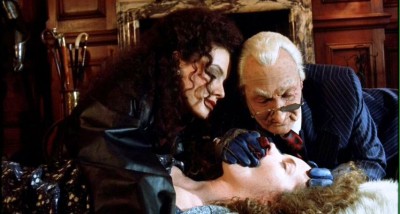
It’s impossible to deny that Tobe Hooper’s The Mangler (1995) — an adaptation of and expansion on Stephen King’s short story — is a movie stuck in a patently absurd premise. However, I’m not at all sure that a commercial laundry folding machine with a bad case of demonic possession is any more ludicrous than the haunted Plymouth Fury found in King’s Christine (which people seem to accept without turning a hair). I suspect the biggest hurdle here comes in the final stretch. After all, cars are meant to be mobile and the idea of an ambulatory steam-press is a little harder to swallow. This, however, doesn’t keep Hooper’s film from being amusingly entertaining in its own right. No matter how absurd, it’s pretty hard to deny that the machine in question is one sinister-looking piece of hardware. (I admit to having an ingrained childhood terror of large machines like the gigantic spark-spewing bandsaw at the lumber company where my father worked in Charlotte. So, I may be more susceptible than most.) Actually, The Mangler works pretty well until the last section — or it does as long as you don’t mind the scenery chewing of the cast, especially Robert Englund’s performance as the utterly evil laundry owner. Then again, subtlety is probably out of the question when playing a half-blind, crippled (all-encompassing leg braces and crutches), lecherous high priest to a steampunkish horror that periodically needs to be fed a virgin. Englund’s character actually comes across as a more successful variant of Jim Siedow’s Texas Chainsaw Massacre cannibalistic entrepreneur — right down to the homespun homilies. Not surprisingly for Hooper, there’s an undercurrent of socio-politcal commentary to the whole thing, expressing a distrust of capitalistic greed — and, in this case, old money. How seriously you want to take Hooper’s thematic concerns — evidenced in most of his better films — is a matter of taste, but it’s obvious that they’re there. And, these days, it’s kind of nice to find a horror-meister in touch with the subversive roots of the genre.




Based on tonight’s screening, this plays pretty well — thought mostly as a comedy.